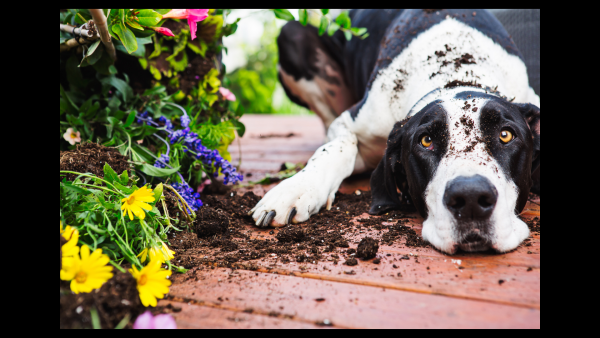5 minute read
Dogs are curious creatures, often exploring the world with their noses and mouths. While our furry friends are known for their love of treats and interesting smells, it's crucial to be aware of the natural foods, plants and scents that can be toxic to dogs. In this blog, we'll delve into some of the unsuspecting hazards that could pose a risk to your canine companion.
Click here to download our handy resource “protecting your pooch - a guide to safeguarding your dog from nature’s toxins.’
The Deceptive Delicacies
Certain natural foods, while harmless to humans, can be downright toxic to dogs. Some common natural examples include grapes, raisins, onions, garlic, and avocados. These foods may lead to a range of health issues, from stomach upset to more severe conditions like kidney damage.
Grapes and their dried varieties are an entirely different ballgame. What makes them toxic and what constitutes a dangerous dose remains largely a mystery. Furthermore, sultanas, raisins, and currants are prevalent ingredients in many foods, including my personal fav, hot cross buns, amplifying the risk they pose.
On one occasion, Ralph was being looked after for an evening by a sitter when he inhaled an entire bag of grapes whilst rummaging with his big head in their bag. Even knowing he’s a 50kg unit of a dog was no guarantee of his safety so he was rushed to the nearest emergency vet for induced vomiting. The result? Several dozen intact grapes and spaghetti (no judgment please).
In the case of any suspected toxicity, do not wait for your pooch to show signs of symptoms - seek immediate vet advice
Aromatic Allergens
The world is full of delightful scents, but not all of them are friendly to dogs. Essential oils are more prominent in everyday households through diffusers and use of more natural cleaning products, yet not all essential oils are essential if you’re a pup parent.
Essential oils are powerful and highly reactive to our bodies, which gives them their therapeutic effect. Many of the components of essential oils are metabolized through the liver. Puppies and dogs with liver disease are more sensitive to their effects. While low exposure levels may only lead to a bit of tummy trouble, concentrated oils like pennyroyal or tea tree oil can impact the liver or nervous system. Some essential oils can even irritate or burn the skin and mouth.
I goofed by tucking a eucalyptus oil-infused hanky under my pillow to battle a Covid-induced stuffy nose, not well received by my 4-legged roommate! Eucalyptus is now a non-essential oil in our household.

Both ingestion and skin exposure can be toxic.
Beware the Blossoms
Decorating with plants can bring a refreshing touch to your home, but it's important to be aware that some of these green beauties can spell trouble for your furry friends. Even seemingly innocent decorative plants and flowers, like daffodils and tulips, can be perilous for your dogs. We recommend consulting your vet before embarking on a planting spree.
Puppies, with their curious mouths, are often at greater risk of plant-related mishaps. Smaller breeds, due to their lower body mass, are more susceptible, and certain food-driven breeds, like lovable Labradors, often can't resist a nibble.
The severity of the situation can range from a mildly upset stomach to a full-blown veterinary emergency, depending on the plant ingested. However, you can easily avoid these woes by steering clear of the most notorious plant culprits, whether they lurk inside or outside your home.
If your dog eats a harmful plant, their reaction depends on factors like how much they consumed, the type of plant, their size, age, and health. Generally, it's best to act quickly and consult a vet if you suspect your dog has eaten a poisonous plant.
Signs of plant poisoning in dogs often include vomiting, diarrhoea, drooling, tremors, pain, breathing difficulty, swallowing problems, seizures, irregular heartbeats, and, in severe cases, heart failure. Vomiting and drooling are common signs, resulting from irritation in the mouth, throat, and stomach. While some plants cause mild stomach issues, others contain strong toxins that can affect the heart or nervous system, potentially leading to severe problems like heart failure or seizures.

Summary:
In the case of any suspected toxicity, do not wait for your pooch to show signs of symptoms - seek immediate vet advice. And we know that prevention is always better than cure so we’ve prepared an exclusive downloadable resource. Download your copy here.
By Cass Cordwell
Scientist, dog enthusiast and founder of houseofdog

